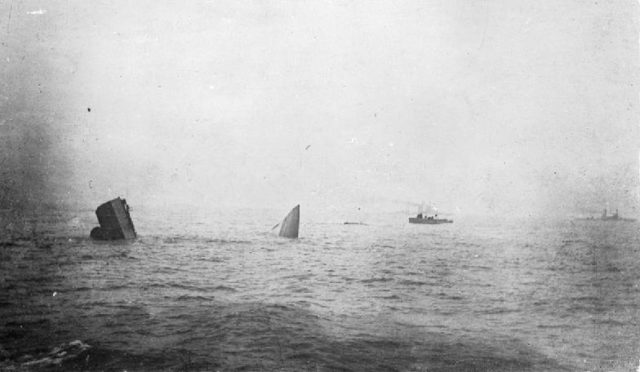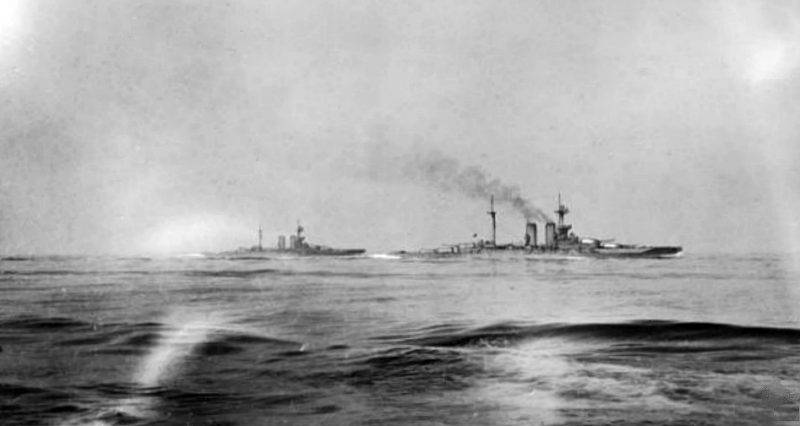It is quite remarkable how strange and wonderful coincidences do occur, such as, for example, the ones experienced by 77-year-old David Morgan.
David had known of some WWI experiences of his father, Geoffrey Morgan, regarding the Battle of Jutland, in which Geoffrey’s ship, the HMS Warrior was sunk. Geoffrey was a quiet and reticent man but had told David that an engine room Petty Officer had prevented him from drowning. David had not known who his father’s rescuer had been – until coincidence stepped in.
David, attending a party of a friend, heard a conversation regarding the new book, ‘A Shy and Simple Warrior.’ This book, written by Rosie Parr, had been published to mark the centenary of the Battle of Jutland. The subject of three men who had only just managed to escape from the wrecked engine room of the sinking HMS Warrior came up. The hero of this particular event was Petty Officer George Lancaster, Rosie Parr’s grandfather, for it was he who had dragged a drowning sailor out of the engine room. David was astounded for – almost 100 years later – he may finally have found out who had saved his father.
David contacted Rosie Parr via her publisher and arranged to meet her. Imagine his surprise at yet another coincidence – Rosie lives fairly close to David in Somerset, England. So – the son of the ‘rescued’ is virtually a neighbor of the granddaughter of the ‘rescuer.’ They were able to establish that it was David’s father that had been rescued by Rosie Parr’s grandfather.
Since Geoffrey had died when David was only 17 years old, Rosie, who had thoroughly researched the subject of the HMS Warrior and the Battle of Jutland, was able to give him much information regarding his father that David had not previously known.

The Battle of Jutland took place off the coast of Denmark, over a period of 36 hours on the 31st May and 1st June 1916. It has been termed the greatest naval battle ever – and was the largest sea battle of WWI. It resulted in the sinking of 11 German and 14 British ships and the loss of over 8000 men. It occurred largely as a result of an attempt to end the successful blockade by Britain, which was causing Germany to suffer severe shortages of food and raw materials.
History is divided on who actually won the battle, as the results were confusing and inconclusive. While both sides claimed victory, Germany lost fewer ships and fewer men, yet for a considerable period, was not able to again face the might of the British at sea.
The HMS Warrior, assigned to the 1st cruiser squadron, was at the head of the Grand Fleet at the Battle of Jutland. Geoffrey Morgan and George Lancaster had both been serving aboard this 10-gunned, armored cruiser for 18 months when it was engaged in the battle. Towards the evening of the 31st May, the HMS Warrior was hit by very heavy shelling. One of the shells pierced the port side of the ship, burying itself in the engine room where it exploded.
Eight sailors had been in the engine room at the time, including the 26-year-old Engineer Lieutenant Geoffrey Morgan and the 29-year-old engine room Petty Officer, George Lancaster. The men battled, in spite of the life-threatening situation, risking their lives in order to keep the engines going. The HMS Warrior managed to escape the enemy fire, (thereby saving the more than 700 sailors on board), but the ship was slowly taking in water, and the men found themselves trapped in the engine room.
They fought their way through the water, damaged bits of machinery and scalding steam. At some time during this life and death struggle, George grabbed Geoffrey who was badly scalded and trapped, was struggling to breathe and was very near to drowning. George dragged him clear and helped him to escape from the engine room.
The HMS Warrior, which was now sinking, had been towed for 70 miles by HMS Engadine, which then maneuvered alongside and with the aid of many willing hands, managed to transfer the survivors, (many badly wounded), to her own decks. At approximately 7 am on the 1st June 1915, the HMS Warrior finally sank below the waters. While most of the ship’s company had been rescued, sadly there were 71 men who had lost their lives.
Considering the many casualties suffered at the Battle of Jutland, Geoffrey and George were fortunate to have survived the sinking of their ship and to have lived on to survive the war. Geoffrey Mason remained in service, worked for the Admiralty, was promoted through the ranks, served in WWII, and retired as a Rear Admiral. He died in 1956. George Lancaster received the Distinguished Service Medal, also served in World War II, at the HMS Drake (Plymouth shore base), reached the rank of Lieutenant Commander and died in 1945.
May these brave men and the thousands of other such war heroes rest in Peace.
